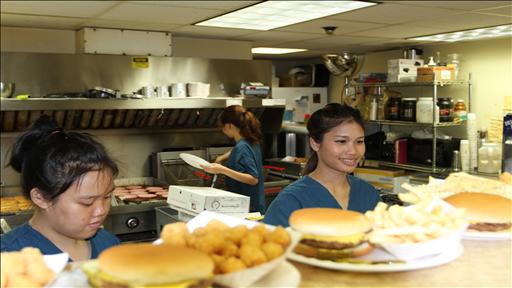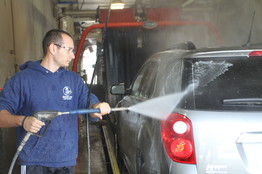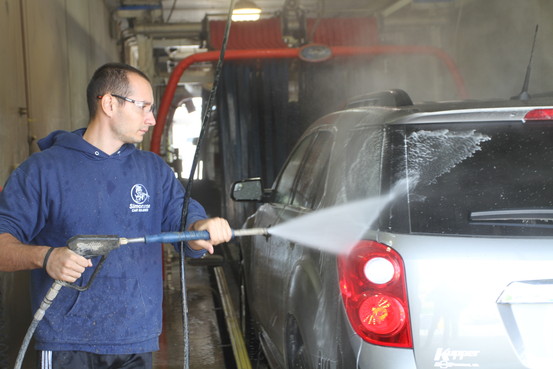By JACK NICAS
WILLISTON, N.D.—With the nearby oil boom draining this city of many of its service workers, businesses here are relying on a cultural-exchange program for foreign college students to keep the local economy humming.
More than 500 foreign students—from Thailand, Jamaica and about a dozen other countries—are staffing nearly every hotel, car wash and fast-food place in town, tending to the troops of roughnecks from the oilfields.
"Without them, I don't know what we'd do," said Ward Koeser, mayor of this city of 16,000, citing long lines, slow service and limited hours at stores and restaurants before the students arrived.
But the State Department is beginning to raise questions about possible misuse of the program, which gives foreign college students four-month visas to work and travel in the U.S. In 1961, Congress created the program for foreign students to fill seasonal or temporary jobs—mostly in beach-resort towns on the coasts—"to strengthen the ties which unite us with other nations."
The program has faced scrutiny in recent years after complaints of harsh working conditions, and in May, the State Department tightened rules on the visas to refocus "on the cultural experience of participants, which in recent years has been overshadowed by the goal of income production." A State Department official said, "We run an exchange program" not a labor program. Officials and employers here say the students in North Dakota are getting a genuine taste of life in the U.S. More than a dozen students interviewed had no complaints of poor working conditions or long hours. Nearly all, however, said they chose North Dakota for the prospects of higher wages and the opportunity to work two jobs, rather than the cultural experience.
"It's a boring town... but I want to make money, so I stay here all summer," said Dragan Mitev, a 21-year-old computer-science major from Macedonia, now on his second summer in Williston with the State Department program. He can earn $700 a week working 60 hours at a grocery store here. Last year, he bought a $6,000 car with his summer earnings, and this summer, he plans to fund a year of college.
Williston and the surrounding area face a rare problem in today's economy: more jobs than workers. Since 2006, when new drilling technology opened up the region's shale reserve to oil production, the northwest corner of North Dakota has added 30,000 jobs—a 136% increase. Those jobs were filled by many former service workers in Williston—along with mostly male workers who flocked to the oil jobs from across the country.
While the overall economy here is roaring, the influx of bachelors has strained the service sector. "The men come without a teenager to work at a restaurant or a spouse to work at Wal-Mart, but they still need to get their hair cut and a meal," Mayor Koeser said.
By late 2009, United Work and Travel, a Maryland-based private company authorized by the U.S. to recruit, screen and place foreign students in the exchange program, began offering North Dakota to students as a summer-job destination, highlighting the high wages. In 2010, United Work placed fewer than 15 students in the state. This year, the company is sending about 1,000 students to North Dakota, or one-fifth of all its placements.
Many businesses here have come to depend on the program for about a third of their work force. Indeed, managers complained about the gap in October and November, when most students are in school and not available for the program.
In October last year, "every business hurt. I mean it was literally overnight," said Vern Brekhus, manager of the local McDonald's, where 30 of the 87 employees are foreign students.
To the State Department, such reliance on the program is problematic, because the jobs are supposed to be seasonal or temporary. "If one-third of the jobs are constantly being filled (by foreign students), we'd want to put a stop to that," the official said, noting the program in North Dakota is due for a site visit this summer. "We don't want a (foreign) student to displace an American."
Officials and employers in Williston say that logic doesn't apply. As of May, the county surrounding Williston had nearly 1,700 unfilled jobs and 240 people unemployed. The unemployment rate is 0.7%. "It'd be different if we had people being kept from a job because of them," Mayor Koeser said. "Everyone here who wants a job has a job."
United Work President Kasey Simon said the jobs are temporary because they are created by the oil boom, which won't last forever. He also said United Work facilitates outings for the students to a national park and Mount Rushmore in South Dakota.
But most foreign students interviewed were clear about why they came to North Dakota. The average job for a programparticipant outside the state pays about $8 an hour, Mr. Simon said, compared to $9 to $10 an hour in North Dakota. In Williston, some jobs range as high as $12 an hour. About 90% of the foreign students in North Dakota hold two or more jobs.
Janike Banton and Colesha Phelps, best friends from Jamaica who are spending their second summer here, said they can each make about $800 a week working two full-time jobs together. They spent a previous summer in the program near the beach in Florida, but "the opportunities are here and we can use the money to pay our tuition," Ms. Banton said.
The women stay with four other Jamaicans in a three-bedroom home provided by one of their employers. Other students pay $100 a week to live in dormitories at Williston State College.
The influx of foreigners in a city that is 93% white has been jarring for some residents. Merle Gunlock, a 90-year-old retired rancher and lifelong resident, said the students are the first foreigners he has ever seen working in Williston. "They've been very polite," he said, though he wishes some spoke better English.
Business owners laud the students' work ethic, and say that without them, the local employees "would just quit because it's too hard and it's too busy," said Mr. Brekhus of McDonald's. "Everyone's got to eat, but who's going to serve them?"
Write to Jack Nicas at jack.nicas@wsj.com
A version of this article appeared June 29, 2012, on page A3 in the U.S. edition of The Wall Street Journal, with the headline: Oil Brings Foreign Accent to North Dakota.

















![[image]](https://iza-server.uibk.ac.at/pywb/dilimag/20210113092156im_/http://si.wsj.net/public/resources/images/MK-BV397_SOCCER_A_20120701185645.jpg)
![[image]](https://iza-server.uibk.ac.at/pywb/dilimag/20210113092156im_/http://si.wsj.net/public/resources/images/P1-BG867_CRUNCH_A_20120701220017.jpg)
![[image]](https://iza-server.uibk.ac.at/pywb/dilimag/20210113092156im_/http://si.wsj.net/public/resources/images/WO-AK277_HKHU_A_20120701171710.jpg)
![[image]](https://iza-server.uibk.ac.at/pywb/dilimag/20210113092156im_/http://si.wsj.net/public/resources/images/P1-BG850_SCYTHE_C_20120629173254.jpg)
![[image]](https://iza-server.uibk.ac.at/pywb/dilimag/20210113092156im_/http://si.wsj.net/public/resources/images/OB-TO602_boxila_C_20120628203443.jpg)
![[OB-TO555_spidey_C_20120628175021.jpg]](https://iza-server.uibk.ac.at/pywb/dilimag/20210113092156im_/http://si.wsj.net/public/resources/images/OB-TO555_spidey_C_20120628175021.jpg)
![[image]](https://iza-server.uibk.ac.at/pywb/dilimag/20210113092156im_/http://si.wsj.net/public/resources/images/OD-AS358_CRUISE_C_20120628134552.jpg)
![[image]](https://iza-server.uibk.ac.at/pywb/dilimag/20210113092156im_/http://si.wsj.net/public/resources/images/RV-AH340_MASTER_C_20120628162030.jpg)








Most Recommended
“Try and fathom the hypocrisy of ...;”
“Perhaps, Mr Gensert, it's not th...;”
“Another thoughtful and concise...;”
“However, Ms Napolitano immediate...;”
“My thought, exactly...You go on...;”